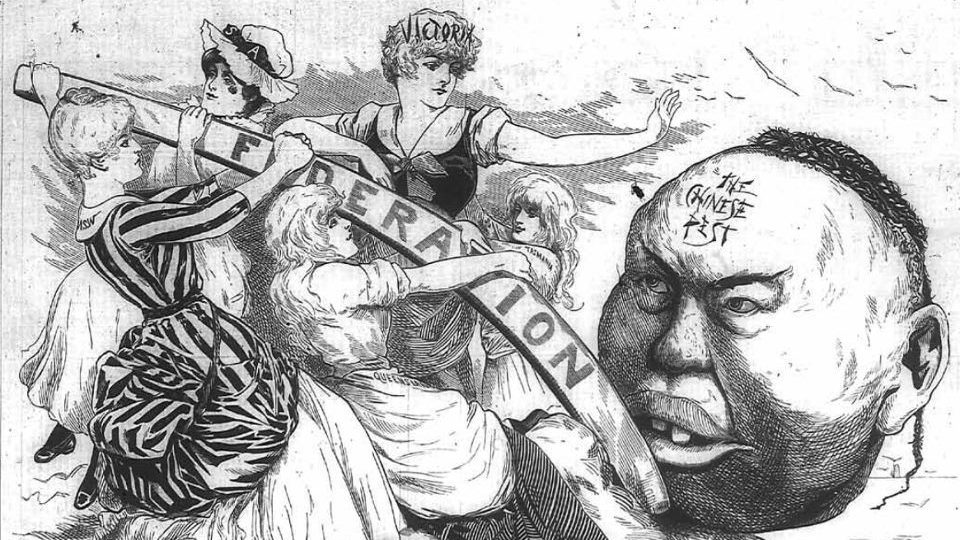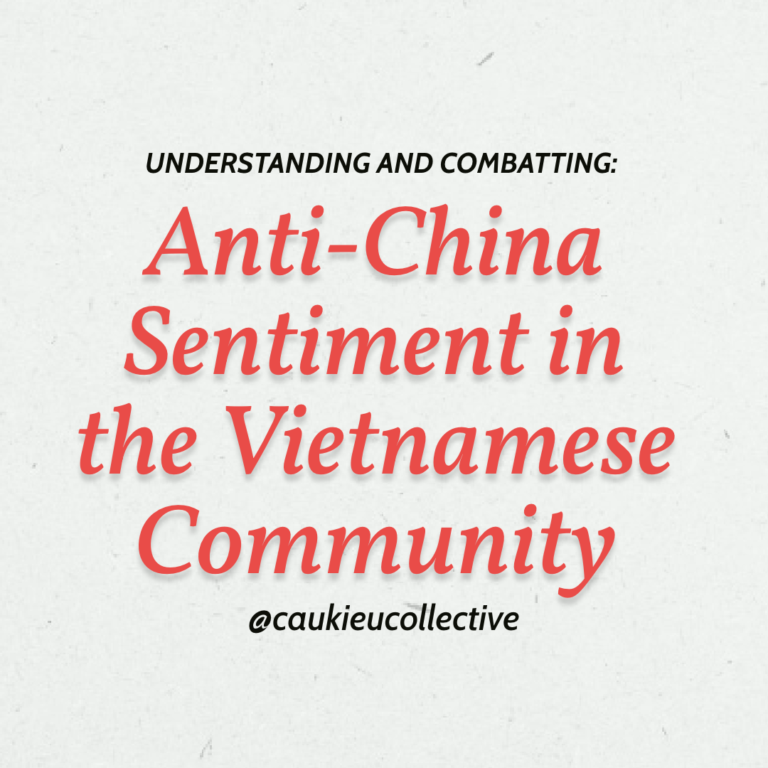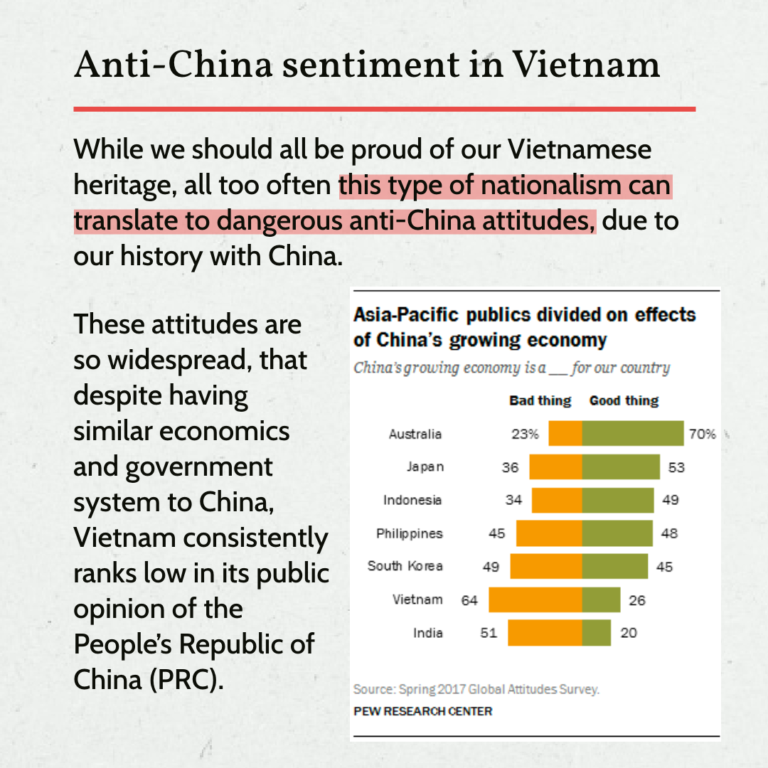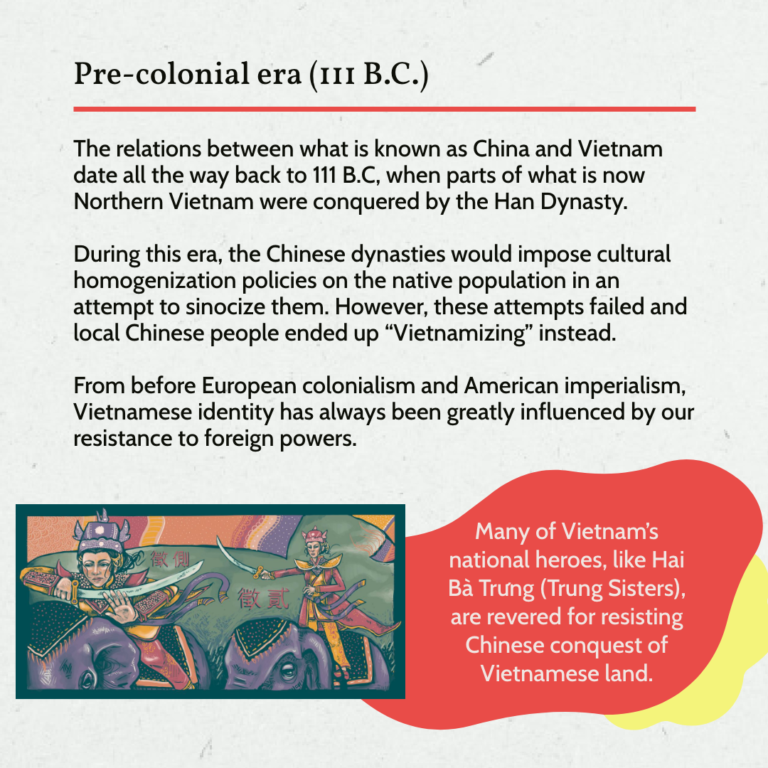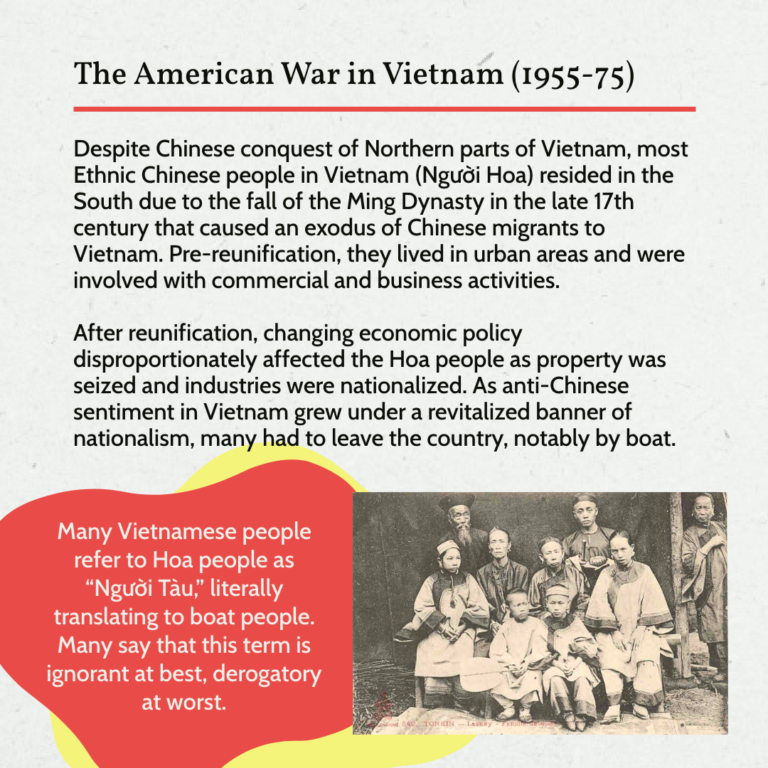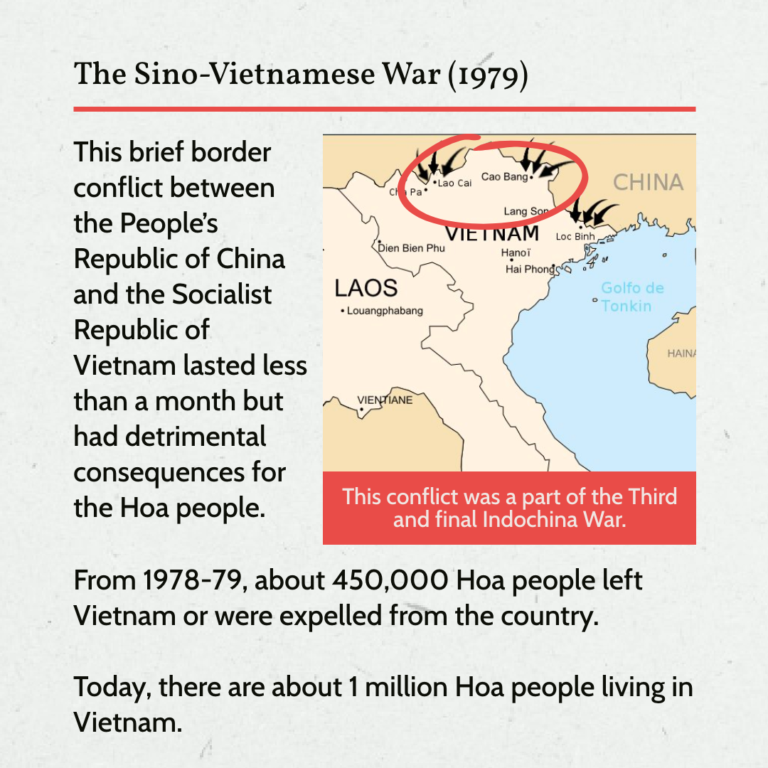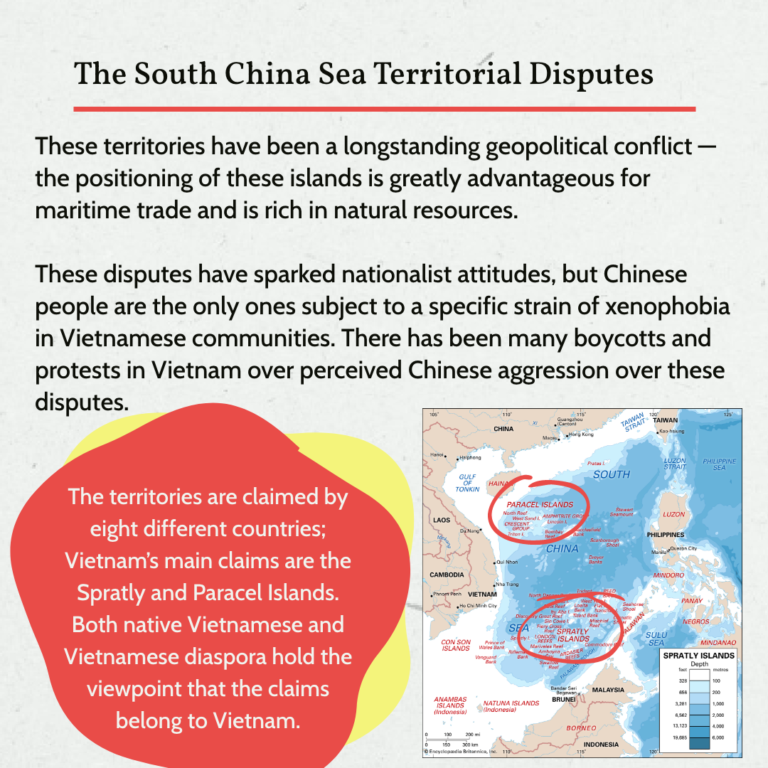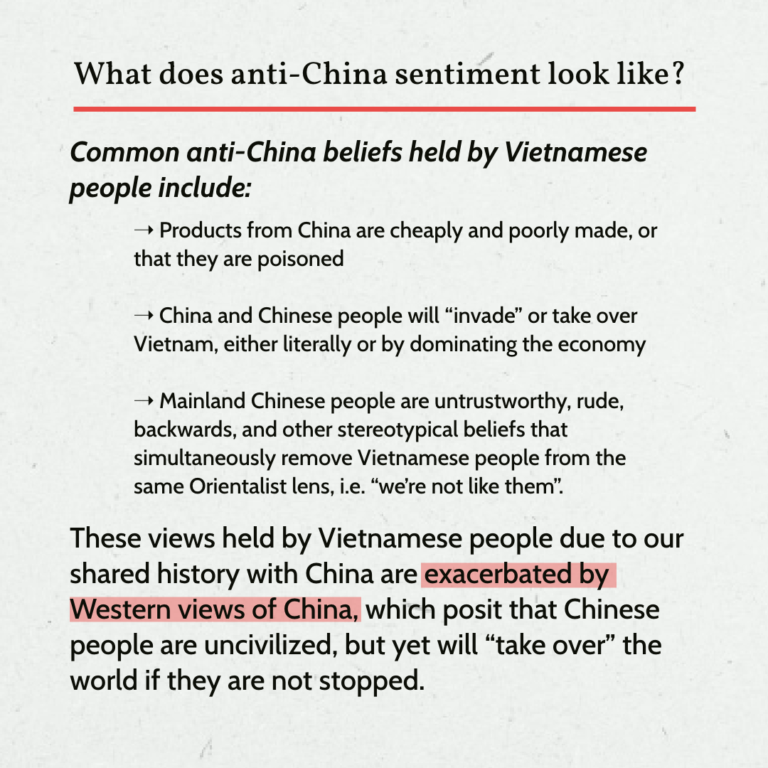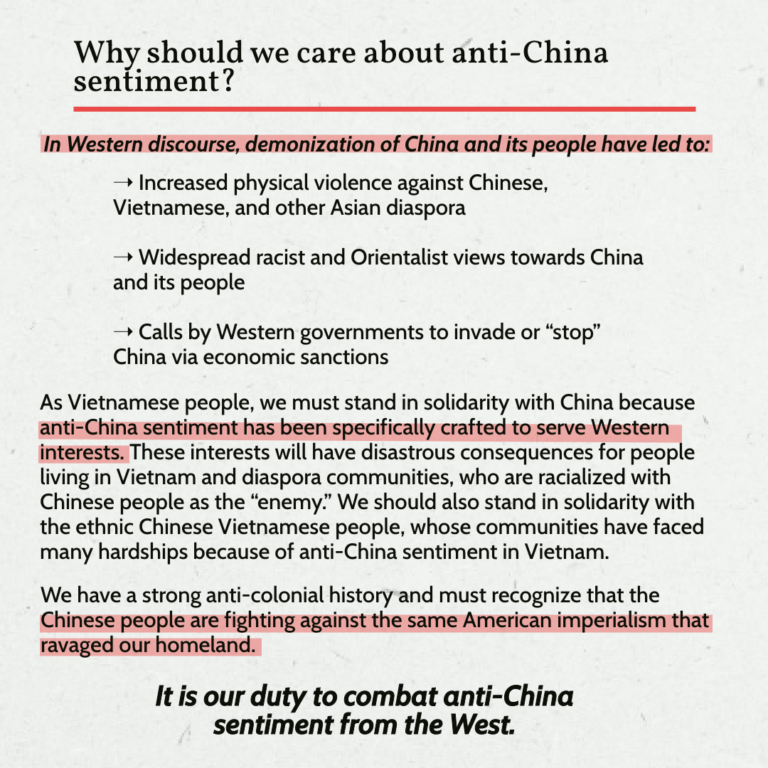What is anti-China sentiment?
Anti-China sentiment, also called sinophobia, is defined as “a fear or dislike of China, or Chinese people, their language or culture.”
Sinophobia has deep roots in Vietnam and by extension, Vietnamese diaspora communities.
These sentiments are shaped by historical and contemporary events. In the diaspora, the pervasive attitudes of anti-communism heighten these sentiments to dangerous levels.
These attitudes are exacerbated and actively abetted by Western propaganda, especially in the current political moment.
Anti-China sentiment in Vietnam
While we should all be proud of our Vietnamese heritage, all too often this type of nationalism can translate to dangerous anti-China attitudes, due to our history with China.
These attitudes are so widespread, that despite having similar economics and government system to China, Vietnam consistently ranks low in its public opinion of the People’s Republic of China (PRC).
Pre-colonial era (111 B.C.)
The relations between what is known as China and Vietnam date all the way back to 111 B.C, when parts of what is now Northern Vietnam were conquered by the Han Dynasty.
During this era, the Chinese dynasties would impose cultural homogenization policies on the native population in an attempt to sinocize them. However, these attempts failed and local Chinese people ended up “Vietnamizing” instead.
From before European colonialism and American imperialism, Vietnamese identity has always been greatly influenced by our resistance to foreign powers.
Many of Vietnam’s national heroes, like Hai Bà Trưng (Trưng sisters), are revered for resisting Chinese conquest of Vietnamese land.
The American war in Vietnam (1955-75)
Despite Chinese conquest of Northern parts of Vietnam, most Ethnic Chinese people in Vietnam (Người Hoa) resided in the South due to the fall of the Ming Dynasty in the late 17th century that caused an exodus of Chinese migrants to Vietnam. Pre-reunification, they lived in urban areas and were involved with commercial and business activities.
After reunification, changing economic policy disproportionately affected the Hoa people as property was seized and industries were nationalized. As anti-Chinese sentiment in Vietnam grew under a revitalized banner of nationalism, many had to leave the country, notably by boat.
Many Vietnamese people refer to Hoa people as “Người Tàu” literally translating to boat people. Many say that this term is ignorant at best, derogatory at worst.
The Sino-Vietnamese War (1979)
This brief border conflict between the People’s Republic of China and the Socialist Republic of Vietnam lasted less than a month but had detrimental consequences for the Hoa people.
From 1978-79, about 450,000 Hoa people left Vietnam or were expelled from the country.
Today, there are about 1 million Hoa people living in Vietnam.
The South China Sea territorial disputes
These territories have been a longstanding geopolitical conflict — the positioning of these islands is greatly advantageous for maritime trade and is rich in natural resources.
These disputes have sparked nationalist attitudes, but Chinese people are the only ones subject to a specific strain of xenophobia in Vietnamese communities. There has been many boycotts and protests in Vietnam over perceived Chinese aggression over these disputes.
The territories are claimed by eight different countries; Vietnam’s main claims are the Spratly and Paracel Islands. Both native Vietnamese and Vietnamese diaspora hold the viewpoint that the claims belong to Vietnam.
What does anti-China sentiment look like?
Common anti-China beliefs held by Vietnamese people include:
- Products from China are cheaply and poorly made, or that they are poisoned
- China and Chinese people will “invade” or take over Vietnam, either literally or by dominating the economy
- Mainland Chinese people are untrustworthy, rude, backwards, and other stereotypical beliefs that simultaneously remove Vietnamese people from the same Orientalist lens, i.e. “we’re not like them”.
These views held by Vietnamese people due to our shared history with China are exacerbated by Western views of China, which posit that Chinese people are uncivilized, but yet will “take over” the world if they are not stopped.
Why should we care about anti-China sentiment?
In Western discourse, demonization of China and its people have led to:
- Increased physical violence against Chinese, Vietnamese, and other Asian diaspora
- Widespread racist and Orientalist views towards China and its people
- Calls by Western governments to invade or “stop” China via economic sanctions
As Vietnamese people, we must stand in solidarity with China because anti-China sentiment has been specifically crafted to serve Western interests. These interests will have disastrous consequences for people living in Vietnam and diaspora communities, who are racialized with Chinese people as the “enemy.”
We should also stand in solidarity with the ethnic Chinese Vietnamese people, whose communities have faced many hardships because of anti-China sentiment in Vietnam. We have a strong anti-colonial history and must recognize that the Chinese people are fighting against the same American imperialism that ravaged our homeland. It is our duty to combat anti-China sentiment from the West.
Sources
Vietnam: Chinese (Hoa) from Minority Rights Group International
Vietnamese History: A Chronological Outline from Columbia University
Hai Bà Trưng: How Two Sisters Fought off a Dynasty from The Milieux
The Paradox of Sinophobia and Economic Ties in Vietnam by Kien Pham from The Contemporary
How people in Asia-Pacific view China by Laura Silver from Pew Research Center
Sinophobia from Collins Dictionary
Anti-Chinese Sentiment in Contemporary Vietnam: Constructing Nationalism, New Democracy, and the Use of “the Other” by Nhi Hoang Thuc Nguyen from Trinity University
